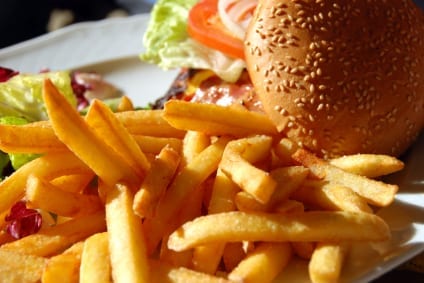 Last month, an obesity specialist at Children’s Hospital Boston and a lawyer at Harvard’s School of Public Health set off a firestorm parenting debate: they recommended that seriously overweight children be taken away from their parents, aligning childhood obesity with other forms of childhood abuse.
Last month, an obesity specialist at Children’s Hospital Boston and a lawyer at Harvard’s School of Public Health set off a firestorm parenting debate: they recommended that seriously overweight children be taken away from their parents, aligning childhood obesity with other forms of childhood abuse.
The same week their editorial was published in the Journal of the American Medical Association, a 16-pound baby was born to an obese Texas mother. It was the largest baby ever born in the state of Texas.
That Friday, I took my kids to my favorite summer water park, and had plenty of opportunity to witness obese kids firsthand – many being pushed in strollers rather than walking and burning off a few of those extra calories.
Severe childhood obesity has become an epidemic in the United States. Over two million children meet the medical classification of obesity. Some of these children are taking in more than 1,000 calories a day than they should, suggesting profoundly destructive, dysfunctional eating habits. Being seriously overweight threatens the quality of children’s lives, shortens their life expectancies, and introduces diabetes, high cholesterol and heart conditions long before they reach their 21st birthday. And widespread obesity is expensive for our entire society in terms of increased health care costs.
I am far from perfect in the nutrition department. I love my Haagen Dasz and my coffee in the morning. I hate cooking and I am lousy at it. I feed my kids frozen chicken nuggets at least once a week.
But through a few tricks, I’ve learned to teach my kids balanced eating. If I can do it, anyone can. Here are the top tips I’ve picked up over the fifteen years I’ve been feeding my kids:
- Put out the fruit and veggies when they are hungry. An hour before a meal, I stick a plate of carrots and grapes or whatever is in season in front of them. It is amazing what kids will put in their mouths when they are starving.
- Be careful what your kids drink – not just what they eat. Stock only milk and water in your house. Forget juice – it has few nutritional advantages and it destroys kids’ teeth. If your kids need flavor, turn to Gatorade’s G2, diet soda, or drinks sweetened with healthy sweeteners such as Splenda. Isn’t a little artificial sweetener far preferable to a lifetime of being overweight?
- As kids get older and start raiding the fridge themselves, put cut fruit and veggies in Tupperware on the lowest shelves. Make it easy for them to grab a healthy snack.
- Dairy products and nuts are your friends (as long as your kids aren’t allergic). Eating dairy and nuts have been shown to reduce obesity – and most kids like them. Plus they are easy to stock and serve. Yogurt, cottage cheese, lowfat mozzarella sticks, a handful of almonds all make great snacks or side dishes.
- Do not buy junk food or sugared sodas. Do not go to fast food restaurants more than once a month. Do not make exceptions! Your buying power gives you control over your kids’ eating habits. Use it!
-
If you hate cooking (like me), pick one healthy staple and make a lot of it. For fifteen years I’ve made a pot of turkey spaghetti sauce every Sunday. We eat it all week (my kids eat it for breakfast sometimes). Ditto for other healthy dishes–always make plenty of leftovers. Make eating healthy leftovers easier than heating up those nuggets and fries.
But removing children from their parents? That’s no solution. Overweight kids often have overweight parents. How then can the kids learn how to eat nutritiously and use exercise as a tool for better health? Parents – and their children – need nutritional counseling, not punishment. Our courts mandate anger management classes and alcohol and drug abuse counseling. Why not establish a court-ordered healthy eating program for parents of obese children?
I don’t believe kids want to be fat – and I don’t believe parents want their kids to suffer from being fat. But society’s role is to help parents be better role models. Not to punish them – or their parents – for their lack of knowledge. We all benefit from a more constructive approach to the obesity epidemic.





